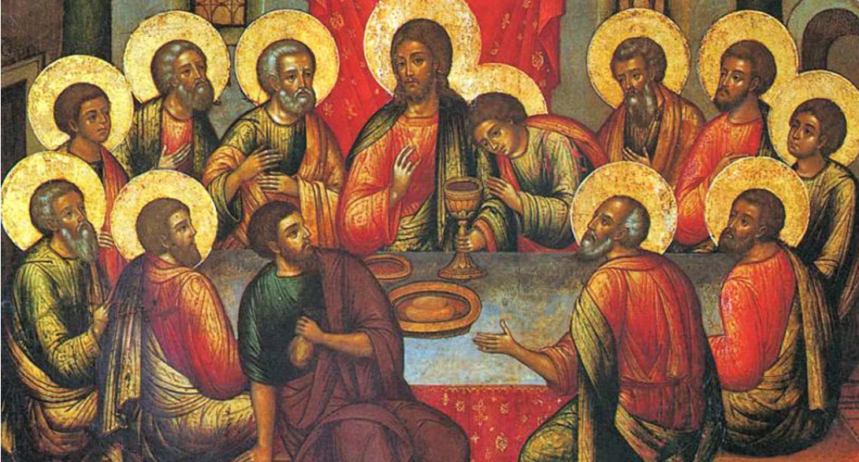
This is the time of year where Easter Sunday becomes the center for many. Here’s what it means to me.
by SHAUN KENNEY
Columnist (and Penitent Easter Catholic)
My Lenten traditions start with a tiny little book I keep above the fireplace consisting of a hardback edition of St. Thomas Aquinas’ Lenten Reflections. These reflections begin right about the time when winter is getting old, long after Christmas and January and ice storms and snowstorms. At least in Virginia, everything is cold and wet and dreary.
And then Lent begins.
Now for St. Thomas Aquinas, his reflections begin a week before Ash Wednesday, where Catholics go out of their way to be branded with either a very dark smudge or a wide cross — some darker than others — created from the ashes from last year’s palms slipped away from crosses and out of cars and given to the priest the prior Sunday. The whole process is rather solemn, and marked not just with a physical dab of ash on the forehead, but with the reminder:
Remember thou art dust, and to dust you shall return.
Traditionally, we were asked to do two things during Lent: (1) give up something and (2) commit to a good habit. Chocolate and not picking on my brothers was insufficient. The sacrifice had to be something broad and sweeping such as all sweets, or in later years all caffeine. As for good habits, it couldn’t be something you ought to do, but something that was hard to do such as walking 10,000 steps every day, using that gym membership you bought in January, or committing to praying your Rosary every day in the car and in silence.
Now 40 days may seem like a rough go until you realize there are loopholes. For instance, feast days are always exempt and in fact it might even be a fault — scruples — to insist on a Lenten fast during a feast day. Sundays being feast days, fasting is indeed forbidden as per the early tradition of the Church. If you have a medical condition, fasting isn’t required. If you are sick, fasting isn’t required.
Yet by and large, one can see both the practical conditions for fasting from either a particular thing or all day Friday — the larder is getting thinner and thinner by late winter after all — and how that might help teach a person that physical pleasures such as food, wine, beer, coffee, chocolate, etc. aren’t the end-all-be-all for our existence here on earth.
Maybe — just maybe — we were built for more.
Of course, the seasons co-operate, starting with crocuses and daffodils before exploding into red bud trees, cherry blossoms, tulips (guerilla and otherwise), and that most universally hated of all interlopers — the Bradford Pear. Drab greys turn into pregnant greens and with luck those most Virginian of colors from pink azaleas to white dogwoods come just in time for Holy Week. The air looks warmer and feels brighter. Ambitious souls such as myself start thinking of peas, potatoes, broccoli and lettuce in gardens (yes, mine are already in).
St. Patrick’s Day yields to Palm Sunday, and for myself it just might be the highlight of the Lenten season, as bright green palms are tucked away behind images of the Blessed Mother and crucifixes again. The breeze is cool, the windows might even be open that Sunday — but there’s the added sense of anticipation heading into the Easter Triduum. That something is about to happen.
By the time we have arrived at Holy Thursday, I have taken off for the afternoon to be in a certain place. Call me crazy, but this is where I remember my trips to the Holy Land and am reminded of a singular fact which neither history nor conscience can deny. That all of this really did happen.
Archaeologists have no idea where the Last Supper was held, but we know the event took place. We know precisely where Gethsemane is and how the olive trees in the garden might be old enough to have been there when Christ was present. We know precisely the cell where Christ was kept before being delivered to the Antonia Fortress. We generally know where Christ was scourged by the Roman soldiers using a flagellum — a whip embedded with dull hooks and lead bits which first softened then finally ripped flesh away. We know precisely where Christ began walking to Mount Calvary. We know precisely where Christ was crucified because the Emperor Hadrian attempted to remove the mountain itself in order to erase the Christian cult entirely. We know precisely where Christ’s body was prepared for burial. We know precisely where Christ was laid in the tomb.
And we know that this tomb is empty.
We also know this — that the person of Jesus Christ existed and that the historical accounts are indeed credible and worthy of belief. We also know that those who were present among Jesus Christ all suffered martyrdom, willingly surrendering their lives rather than deny a person they claimed to be both the Son of Man and Son of God. No one dies for Mother Goose or Aesop’s Fables — yet these men did.
What did they preach? Victory over death. Of whom did they approve? The poor in spirit, those who mourn, the meek, those who hunger for righteousness, the merciful, the pure of heart, the peacemakers and the persecuted. His friends? Tax collectors, fishermen, doctors, activists, thieves, drunks, and prostitutes. What acts did they perform? Feeding the hungry, giving drink to the thirsty, welcoming the stranger, clothing the naked, caring for the sick, and visiting the imprisoned. The lame walked, the blind saw, lepers were healed.
Christ explains all of this in John 14, and while we tend to abbreviate Christ’s teaching with “I am the Way, the Truth, and the Life” we tend to ignore the rest of the chapter, as the Apostles — unsatisfied with the answer — pepper Jesus with the same question that Pilate will ask on Good Friday: “But how do we know?” The response is elegant, short, and masterful:
Peace I leave with you; my peace I give you. I do not give to you as the world gives. Do not let your hearts be troubled and do not be afraid.
Five things you can write down on a sticky note and use whenever there’s a decision good or bad to be taken — in effect, is the thing right:
- You’ll know because your heart will be at peace.
- You’ll know because that peace is the peace of God.
- You’ll know because it is a free gift for which nothing in return is asked.
- Do not let your heart be troubled; do not let anyone or anything steal your joy.
- DO NOT BE AFRAID.
Notice that you don’t get “you’ll know because it will be super easy” or “you’ll know because it won’t be hard” and all that. Might be that and more, but do not be troubled, and do not be afraid.
Yes — people will hate you for saying this. Some people are slaves to their passions and can see no other path other than forcing you to reconcile with misery. Some of them will run you down, defame you — and might even kill you for electing a path which at core says one simple thing: “It doesn’t have to be this way.”
Certainly the Roman Imperium could not tolerate such a thing — in fact, they required the very opposite: submission to power, and one power at that. Anxiety, power, duties, despair, fear — every totalitarian regime in history from Nero to Bonaparte to Stalin to the present day coming wrapped in an American flag and carrying a Bible feeds on creating a distemper in us and then in one another in order to either take advantage of a crisis or prevent change at all.
No small wonder then why the early Christians who understood their faith unalloyed by the political religions then or now were willing to die rather than give up their peace, that gift, the joy of faith in something and Someone who had conquered death and loved each one of us to the point that the Author of the Universe was willing to die so that we could be with God forever.
This is where the Christian faith strikes home for me. Jesus of Nazareth was no mere fairy tale. Jesus existed. Men and women who knew him were willing to be put to death for what Jesus Christ taught and gave. Those who knew those men and women were in turn willing to die for that belief. It is often remarked that Christ could be Lord, liar, lunatic, myth or guru — but not all at once. No one believes a liar, no one follows a lunatic, no one sacrifices themselves for a myth, and no practicing Jew could ever become a guru. The alarming and terrifying truth? Jesus was indeed precisely who he said he was: God the Son made man offering a perfect sacrifice for my salvation. For your salvation. For peace.
It is often reflect that the Easter Triduum is an event so real, so grounded in human history, that it effectively split time into two eras: Before Christ and Anno Domini. If our reason leads us to the conclusion that the event and person of Jesus Christ was indeed real, then his commandments — to love the Lord God with everything, and to love one another as Christ loves us (even to the point of death!) — have a moral and social claim on us as individuals and as a community of persons.
And it is indeed a gift. Offered freely and in perfect love by the God of the Universe.
One option remains to the rational observer, to the fides quaerens intellectum. Do not be afraid. Do not be troubled. Peace is a gift. Freedom exists in Truth, and in that Truth there is one Way — and one Life. If I am proselytizing a bit here, it is not from a place of coercion, but rather an enthusiasm and a peace and a love which I freely share and see every Easter Sunday.
St. John Chrysostom’s Easter Homily — literally the “golden mouth” whose liturgies and homilies impressed so many early Christians — is traditionally said during Easter Mass and for good reason.
I leave it with you here and hope it impacts you the same way it impacts me every year:
Let all pious men and all lovers of God rejoice in the splendor of this feast;
let the wise servants blissfully enter into the joy of their Lord;
let those who have borne the burden of Lent now receive their pay,
and those who have toiled since the first hour,
let them now receive their due reward;
let any who came after the third hour be grateful to join in the feast,
and those who may have come after the sixth,
let them not be afraid of being too late;
for the Lord is gracious and He receives the last even as the first.
He gives rest to him who comes on the eleventh hour
as well as to him who has toiled since the first:
yes, He has pity on the last and He serves the first;
He rewards the one and praises the effort.Come you all: enter into the joy of your Lord!
You the first and you the last, receive alike your reward;
you rich and you poor, dance together;
you sober and you weaklings, celebrate the day;
you who have kept the fast and you who have not, rejoice today!
The table is richly loaded: enjoy its royal banquet.
The calf is a fatted one: let no one go away hungry.
All of you enjoy the banquet of faith;
all of you receive the riches of his goodness.
Let no one grieve over his poverty,
for the universal kingdom has been revealed;
let no one weep over his sins, for pardon has shone from the grave;
let no one fear death, for the death of our Saviour has set us free:
He has destroyed it by enduring it,
He has despoiled Hades by going down into its kingdom,
He has angered it by allowing it to taste of his flesh.When Isaias foresaw all this, he cried out:
“O Hades, you have been angered by encountering Him in the nether world.”
Hades is angered because frustrated,
it is angered because it has been mocked,
it is angered because it has been destroyed,
it is angered because it has been reduced to naught,
it is angered because it is now captive.
It seized a body, and, lo! it encountered heaven;
it seized the visible,
and was overcome by the invisible.O death, where is your sting?
O Hades, where is your victory?
Christ is risen and you are abolished.
Christ is risen and the demons are cast down.
Christ is risen and the angels rejoice.
Christ is risen and life is freed.
Christ is risen and the tomb is emptied of the dead:
for Christ, being risen from the dead,
has become the Leader and Reviver of those who had fallen asleep.
To Him be glory and power
for ever and ever.
Amen.
As with most things, I invoke the mighty visage of Dr. Robert Nozick: “My thoughts do not aim for your assent, just place them alongside your own for awhile.”
May you and yours have a happy and fruitful Easter Triduum this year.





